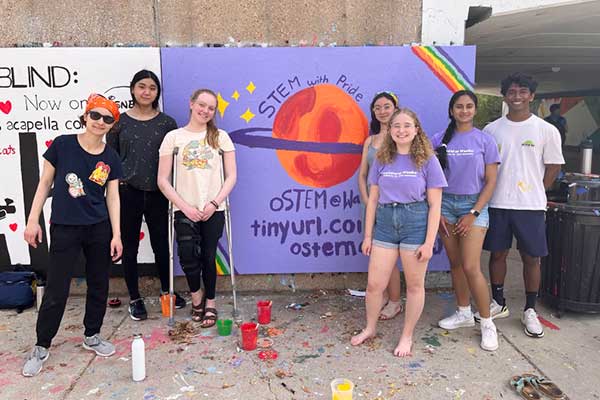‘We filled a gap’: oSTEM among most active organizations at WashU
oSTEM, one of McKelvey Engineering’s newest student organizations, has grown to be among the most active engineering and LGBT groups on campus

While the COVID-19 pandemic made it difficult for many student organizations to retain and attract members, oSTEM was just beginning to make its mark on campus. Now, as life returns to normal, the group has continued to flourish.
oSTEM, which stands for Out in Science, Technology, Engineering and Mathematics, is an international nonprofit professional organization that aims to support LGBT people in STEM. The chapter at Washington University in St. Louis was founded in the summer of 2020.
With nearly 200 members, oSTEM is among the most active engineering and LGBT organizations on campus. About half that number is made up of students from the McKelvey School of Engineering, with the rest coming from the College of Arts and Sciences and the School of Medicine.
Jocelyn Epstein, a rising junior and president of oSTEM, said she wasn’t surprised by the group’s fast growth.
“We filled a gap,” Epstein said. “Not only weren’t there any queer organizations in STEM at WashU, but there also weren’t a lot of organizations offering fun programming during COVID.”
The group hosts professional development workshops and weekly study sessions, as well as fun social events. One of the most popular events the group hosted was a trivia night where they served pizza, despite the annoyance it caused in dealing with the new COVID-19 restrictions.
“I think food is needed to bring in more people,” Epstein said.
The group has held 63 official board meetings since its founding; a number that serves as evidence of how hard the board works to provide programming for members.
"This growth comes with a lot of people and a lot of hours behind it,” Epstein said. “There are a lot of people who really care about this organization and are really dedicated.”
Epstein said that the events are beneficial as they provide members opportunities to hang out with others in the LGBT and STEM community and to feel affirmed in their identity. According to Epstein, LGBT scientists and researchers can sometimes feel as if their identities are secondary to the work that they do.
“When we had our ‘Out in Academia’ panel, this is something they spoke to,” Epstein said. “Some felt that maybe they shouldn’t be out or share who they are because it wasn’t important. It didn’t affect the papers they were publishing or the classes they were teaching. Once they were out, however, they were able to be more authentic and genuine in their research.”
Epstein said that she hopes that events like the “Out in Academia” panel become regular occurrences and that oSTEM continues to grow to become a pillar of the university community.
“Queer individuals are often marginalized in STEM,” Epstein said. “When you’re taking these difficult classes and trying to enter this competitive field, it can be discouraging to try and break in when you don’t see people like you. oSTEM is extremely beneficial because it helps students find their way. They feel as if they're supported both personally and academically.”



